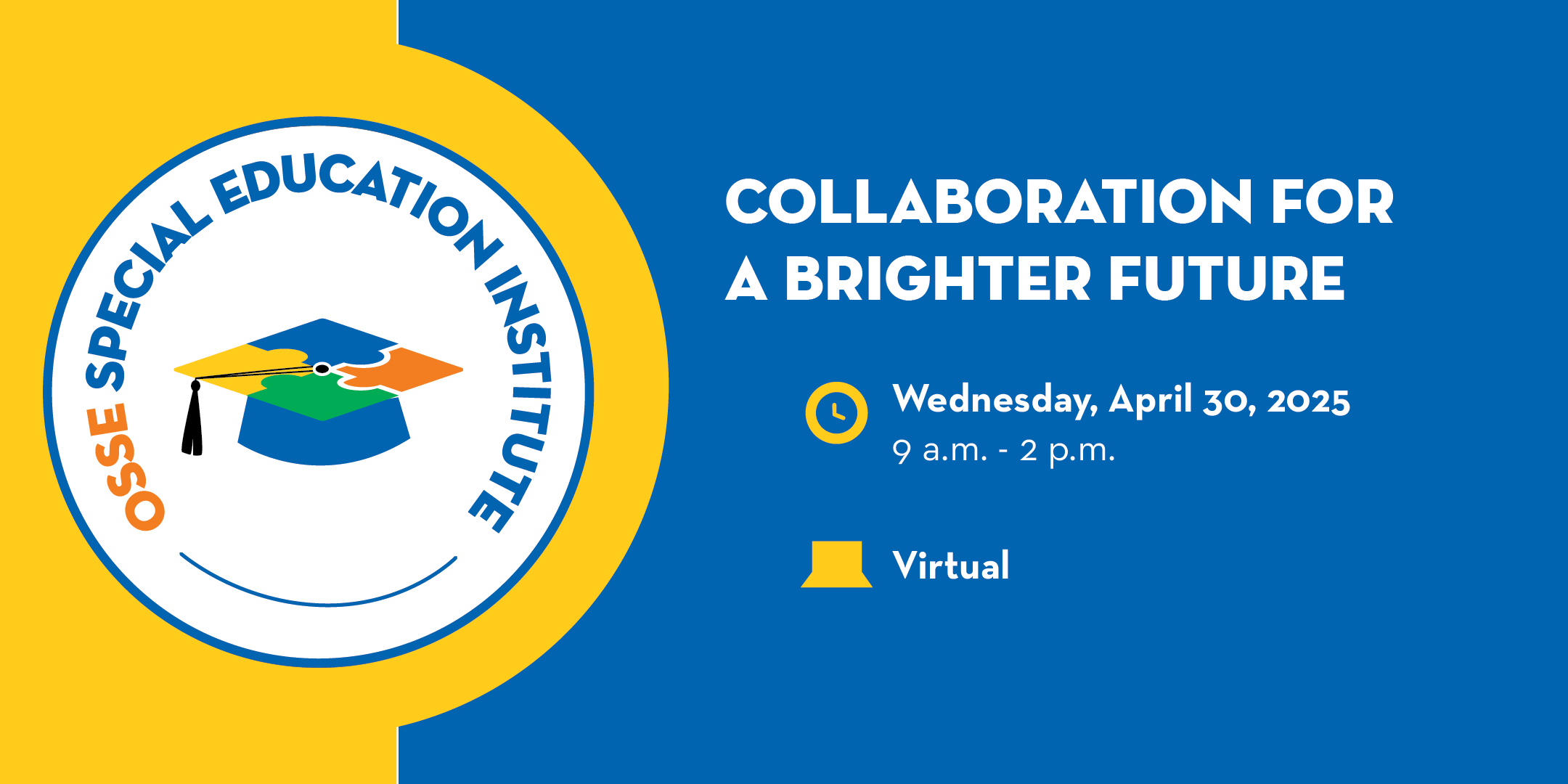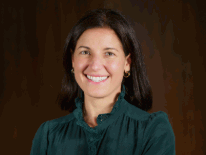- Need Technical Assistance? ossesped@getvfairs.io

The Special Education Institute is a capacity-building conference for leaders in DC education to improve daily practices by implementing high-leverage practices and leverage the Special Education Performance Report (SEPR) to achieve equitable outcomes. Breakout sessions will engage participants to:
 30 April, 2025 09:00 am
to
30 April, 2025 09:00 am
to
Dr. Antoinette Mitchell

Elizabeth Ross
 30 April, 2025 09:40 am
to
30 April, 2025 09:40 am
to
Dr. Antoinette Mitchell

Dr. Chimere Jones
The Reimagining High School Graduation Requirements initiative is highlighted in OSSE’s Recovery to Restoration: 2023-2025 Strategic Plan as a component of the “Build Futures” strategic priority. This initiative is focused on revising the current Graduation Requirements and the creation of a DC Graduate Profile. The aim of this initiative is to identify and implement new high school graduation requirements that incorporate outcome measures and support innovative approaches to preparing young people for life after graduation.
OSSE needs your expertise to shape DC's high school graduation requirements. Your voice is crucial! Share your insights on what our students should achieve by graduation and provide feedback on the current requirements.
 30 April, 2025 09:40 am
to
30 April, 2025 09:40 am
to
Jason Andrews
Educators will delve deeper into how to leverage collabortation to create a highly effective multitiered system of supports (MTSS). Explore—tier by tier—the essential actions of the guiding coalition, teacher teams, and intervention team.
 30 April, 2025 10:35 am
to
30 April, 2025 10:35 am
to
Brandan Persaud
This session will ground participants in defining and prioritizing inclusion and service delivery in a literacy classroom. Participants will review the implementation of Amplify's CKLA skills and integrated literacy curricula at an LEA in Washington, DC, and explore the inner workings of exposure to grade-level content through high-yield co-teaching approaches. Participants will leave this session with practical ways to improve inclusion in their classroom/ school environment.
 30 April, 2025 10:35 am
to
30 April, 2025 10:35 am
to
LaShonda Wilson-Carter

Beth Clavenna-Deane
This session will identify strategies secondary school educators, administrators, and counselors can implement to create a solid framework that partners with families, students, and the community and ensures a team effort is invested in reaching the school’s goals.
Secondary educators and administrators often set goals for engaging families and students in relevant and high-quality post-secondary planning. Implementing the next steps can become the responsibility of one department or individual, frequently leading to false starts and an inability to reach those goals. Session participants will access OSSE’s Secondary Transition Resource Hub for Family Partnerships and Self-Determination tools and resources they can utilize to actively engage families and students in planning for adulthood. Approaches such as person-centered planning, student-led conferences, and tools for increasing students’ self-determination and family engagement will be described. Participants will determine the tools and resources most appropriate for building stronger community partnerships with students and families. Recommendations for how to build systems that support this effort will be provided to participants.
 30 April, 2025 10:35 am
to
30 April, 2025 10:35 am
to
Jennifer Carpenter

Jessica Bibb
The IEP should be a living plan that sets students on a path to success. This session shares how DCPS is shifting compliance-focused IEP development by leveraging the power of Specifically Designed Instruction.
Participants will:
1. Understand how to help others see the connection between SDI and the IEP when a past focus has been on compliance/monitoring.
2. Learn practical strategies and techniques for supporting educators in implementing SDI.
3. Reflect on how their systems may need to be refocused to promote the successful inclusion of students with disabilities.
 30 April, 2025 10:35 am
to
30 April, 2025 10:35 am
to
Dr. Charlene Roach-Glymph

Erin Larkin-Maguire
Aligning on a Vision of Excellence for Inclusion: This session will deepen your understanding of the Office of the State Superintendent of Education’s (OSSE’s) Vision of Excellence for Inclusion and the transformative role of Inclusive Leadership. Together, educators will explore powerful case studies from schools and local education agencies (LEAs) that are actively bringing this vision to life, providing both inspiration and actionable insights. Through collaborative activities and dynamic discussions, you’ll have the opportunity to connect with peers, share your experiences, and uncover practical strategies to assess strengths and identify growth opportunities within your school community.
 30 April, 2025 11:20 am
to
30 April, 2025 11:20 am
to 30 April, 2025 12:20 pm
to
30 April, 2025 12:20 pm
to
Brandan Persaud
This session will ground participants in defining and prioritizing inclusion and service delivery in a literacy classroom. Participants will review the implementation of Amplify's CKLA skills and integrated literacy curricula at an LEA in Washington, DC, and explore the inner workings of exposure to grade-level content through high-yield co-teaching approaches. Participants will leave this session with practical ways to improve inclusion in their classroom/ school environment.
 30 April, 2025 12:20 pm
to
30 April, 2025 12:20 pm
to
Jason Andrews
Educators will delve deeper into how to leverage collabortation to create a highly effective multitiered system of supports (MTSS). Explore—tier by tier—the essential actions of the guiding coalition, teacher teams, and intervention team.
 30 April, 2025 12:20 pm
to
30 April, 2025 12:20 pm
to
Jennifer Carpenter

Jessica Bibb
The IEP should be a living plan that sets students on a path to success. This session shares how DCPS is shifting compliance-focused IEP development by leveraging the power of Specifically Designed Instruction.
Participants will:
1. Understand how to help others see the connection between SDI and the IEP when a past focus has been on compliance/monitoring.
2. Learn practical strategies and techniques for supporting educators in implementing SDI.
3. Reflect on how their systems may need to be refocused to promote the successful inclusion of students with disabilities.
 30 April, 2025 12:20 pm
to
30 April, 2025 12:20 pm
to
Dr. Charlene Roach-Glymph

Erin Larkin-Maguire
Aligning on a Vision of Excellence for Inclusion: This session will deepen your understanding of the Office of the State Superintendent of Education’s (OSSE’s) Vision of Excellence for Inclusion and the transformative role of Inclusive Leadership. Together, educators will explore powerful case studies from schools and local education agencies (LEAs) that are actively bringing this vision to life, providing both inspiration and actionable insights. Through collaborative activities and dynamic discussions, you’ll have the opportunity to connect with peers, share your experiences, and uncover practical strategies to assess strengths and identify growth opportunities within your school community.
 30 April, 2025 01:15 pm
to
30 April, 2025 01:15 pm
to
Hannah Blumenfeld-Love
This presentation focuses on how LEAs can actively engage parents as true partners throughout the IEP process. Participants will learn to foster trust, improve communication and transparency throughout the IEP process, and empower families to contribute meaningfully to decision-making. Emphasizing shared responsibility and mutual respect, this session offers guidance to ensure collaboration isn’t just a requirement, but a foundation for student success.
 30 April, 2025 01:15 pm
to
30 April, 2025 01:15 pm
to Dawn Hilton
Discover how Local Educational Agencies (LEAs) can create seamless transitions from early intervention (Part C) to preschool special education (Part B). This session will introduce LEAs to the foundational principles of early intervention and the Part C-to-B transition process. By focusing on performance metrics, such as timely transitions, initial evaluations, and initial services, participants will learn how to strengthen their reporting practices while supporting smooth transitions and positive outcomes for children.
 30 April, 2025 01:15 pm
to
30 April, 2025 01:15 pm
to
Beth Clavenna-Deane

LaShonda Wilson-Carter
This session will identify strategies secondary school educators, administrators, and counselors can implement to create a solid framework that partners with families, students, and the community and ensures a team effort is invested in reaching the school’s goals. Participants will access OSSE’s Secondary Transition Resource Hub for Family Partnerships and Self-Determination tools and resources they can utilize to actively engage families and students in planning for adulthood. Approaches such as person-centered planning, student-led conferences, and tools for increasing students’ self-determination and family engagement will be described. Participants will determine the tools and resources most appropriate for building stronger community partnerships with students and families. Recommendations for how to build systems that support this effort will be provided to participants.